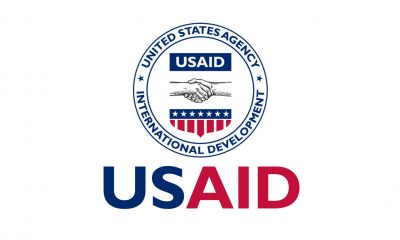Ict/Telecom
Oxford Dictionary Adds Twerk, Carnap, Flotus To English Lexicon
The Oxford English
Dictionary (OED), added twerk, carnap, flotus and scores of other new entries, including many introduced from Asia and from online slang, to its latest edition.
OED Editor, Danica Salazar, said in London yesterday that the word twerk, a dance popularised by music stars and Internet memes, actually dated back about 200 years as a combination of twist and jerk first spelled as “twirk.’’
He said the use of twerk to describe a type of dance, which emphasises the performer’s posterior, has its roots in the early 1990s in the New Orleans ‘bounce’ music scene.
Salazar said the word itself seems to originate from more than 170 years before that.
“Joining twerk in the updated online OED is the acronym FLOTUS, or First Lady of the U.S.
“A term that the First Lady, Michelle Obama, felt obliged to explain to London schoolgirls last week when she mentioned her FLOTUS Twitter handle,’’ he said.
The editor said Philippine word carnap, meaning to “kidnap,” or steal, a car, originated in the mid-20th century in the U.S. but was no longer used there.
He said another word from the Philippines was presidentiable, “a person who is a likely or confirmed candidate for president.”
Salazar said throughout the years, Filipino English speakers have been adapting the vocabulary of this once foreign tongue, using it to express their own identity and way of life.
“Many additions refer to “specific elements of Philippine culture, such as greetings and terms of address.
“The boundless optimism of Filipinos and their unshakeable belief that things will work out in their favour in the end is reflected in the phrase bahala na.”
Salazar said several other new entries are from South Asia and South-east Asia, where several hundred million people use English as a first or second language.
Katherine Martin, the OED’s Head of U.S. dictionaries said the term “Batchmate’’ a member of the same graduation class as another, was used in both Philippine and South Asian English.
She noted that among the latest words popularised via the internet are crowdfunding, Internaut, webisode and photobomb.
Martin said some words and phrases are so well-used that their inclusion in the list of new entries was perhaps surprising.
She identified them as dartboard, tan line, young gun, South Korean, North Korean, Special Olympics, and self-immolate.
Ict/Telecom
Technology, Others Responsible For Nigeria’s Bonga Oil Operations
The Managing Director, Shell Nigeria Exploration and Company Limited (SNEPCo), Elohor Aiboni, said Bonga, Nigeria’s first deep-water asset, has recorded major milestones, due to effective leadership, cutting-edge technology, continuous improvement and collaboration with stakeholders.
She noted that since coming on stream in November 2005, Bonga has maintained a track record of production that saw it achieve one-billion-barrel export on February 13, last year.
In her presentation, titled “The Bonga Journey to a Billion Barrels”, at the ongoing 2024 Offshore Technology Conference in Houston, Texas, United States, Aiboni, said: “SNEPCo is grateful for the contributions of all the parties to the Bonga story and we can all be proud of the milestones.
“Bonga has been consistent. In 2014, nine years after coming onstream, it achieved half a billion barrels of crude and doubled it in 2023. We have worked relentlessly to ensure excellent asset management, project and wells delivery and deployment of technology and innovations in our operations”.
According to her, these factors, “coupled with the supportive partnership of the Nigerian National Petroleum Company Limited and our co-venturers – TotalEnergies, EP Nigeria Limited; Nigerian Agip Exploration; and Esso Exploration and Production Nigeria Limited, make Bonga stand out as a world-class investment case”.
She continued that, “SNEPCo also enjoyed the support of the Nigerian Upstream Petroleum Regulatory Commission (NUPRC) and the Nigerian Content Development and Monitoring Board (NCDMB) in the success of Bonga operations”.
Aiboni also listed the challenges of keeping the Bonga Floating Production, Storage and Offloading vessel full as the asset ages and dealing with unexpected developments with subsea wells and equipment.
She said: “SNEPCo responded with a campaign of operational excellence, which among other initiatives, led to the creation of a programme known as the Bonga Business Improvement Plan that continually reviews and identifies improvement initiatives and drives sustainability in operations and upskilling of staff.
“The Bonga success story has been led by Nigerians who have been managing directors of SNEPCo since it was established in 1993, in a deliberate policy by Shell to develop indigenous manpower for deep-water operations in Nigeria.
“Today, some 97percent of the SNEPCo workforce is Nigerian and overall, Bonga has helped to create a new generation of Nigerian deep-water professionals.
“Our vision at SNEPCo remains to be the best deep-water business, powering growth and achieving net zero emissions in line with Shell’s Powering Progress strategy”.
Ict/Telecom
Banks Cut Borrowing From CBN By 44%
Banks’ borrowings from the Central Bank of Nigeria (CBN) fell month-on-month, (MoM) by 44 percent to N12.16 trillion in April from N21.7 trillion in March.
Analysis of latest data from the CBN shows that the 44percent drop represents the first MoM decline in banks borrowing from since January when it increased by 268.7 percent to N3.6 trillion from N976.29 billion in December 2023.
However, further analysis showed that banks’ deposits in the CBN SDF grew MoM by 118.4 percent to N428.97 billion in April from N196.37 billion in March 2024.
Banks make use of the SLF to access liquidity to run their day-to-day business operations while the Standing Deposit Facility window (SDF) on the other hand, is an overnight deposit facility that allows banks to lodge excess liquidity (money) with the CBN and earn interest.
The decline in banks’ borrowing from SLF may reflect an increase in banking system liquidity and also the decision of the apex bank last year to remove the limit on the remunerable daily placements by banks at the SDF.
According to the CBN Governor, Mr. Olayemi Cardoso, the CBN removed the cap on the remunerable SDF to increase activity in the SDF window and manage liquidity.
Ict/Telecom
Expert Highlights Technology Impact On Fintech Industry Growth
A Financial technology expert, Olatunji Akinrinola, has highlighted the exponential growth of the FinTech industry, which according to him, was driven by technological advancements.
Akinrinola made this assertion in a press release recently, where he stressed that the role of technology in driving this exponential growth in the FinTech sector was very outstanding.
According to him, Technology has revolutionised the way financial services are delivered, making them more accessible, efficient, and inclusive.
“Through innovations such as mobile banking, digital payments, and blockchain technology, FinTech companies have been able to reach a larger population and provided them with access to financial services”, he stated.
Akinrinola emphasised the role of technology in enabling financial inclusion, adding: “Technology has democratised access to financial services, particularly in regions with limited banking infrastructure.
“Mobile money platforms and digital wallets have empowered individuals to conduct financial transactions conveniently and securely, without the need for traditional banking services”.
He also underscored the role of Artificial Intelligence (AI) and data analytics in driving innovation within the FinTech industry, noting: “AI-powered algorithms and predictive analytics have revolutionised risk assessment, fraud detection, and customer personalisation in financial services.
“These technologies enable FinTech companies to provide tailored solutions and mitigate risks more effectively, ultimately enhancing the overall customer experience”.
Akinrinola stressed the importance of regulatory frameworks in fostering the growth of the FinTech industry.
“While technology has accelerated the growth of FinTech, it is essential to establish robust regulatory frameworks to ensure consumer protection and maintain market stability. Regulators play a crucial role in balancing innovation with risk management, thereby creating a conducive environment for the sustainable growth of the FinTech sector”, he stated.
Akinrinola underscored the role of technology in driving the exponential growth of the FinTech industry, saying, “Technology has been a game-changer for the FinTech sector, enabling innovation, expanding access to financial services, and driving economic growth.
“As technology continues to evolve, the FinTech industry will undoubtedly play a significant role in shaping the future of financial services ecosystem”.
Corlins Walter
-

 World14 hours ago
World14 hours agoPope Francis urges global dialogue to prevent world war
-
Rivers13 hours ago
JONAPWD Elections: Commissioner Inaugurates 5-Man Committee
-
Politics15 hours ago
When Women Unite To Pray For SIM
-

 Business13 hours ago
Business13 hours agoUSAID Re-emphasizes Agricultural Collaboration With Nigeria
-

 Featured14 hours ago
Featured14 hours agoWe’ve Only One House Of Assembly Led By Oko-Jumbo, Fubara Clarifies …Signs Into Law N1.188trn Rivers 2025 Budget
-
Business13 hours ago
Agency Partners Foreign Varsity On Climate-Smart Agriculture Advancement
-

 Nation15 hours ago
Nation15 hours agoNUJ backs proposed strike by Lagos-owned media workers
-

 Niger Delta13 hours ago
Niger Delta13 hours agoFouchee Celebrates Asari’s Recognition

